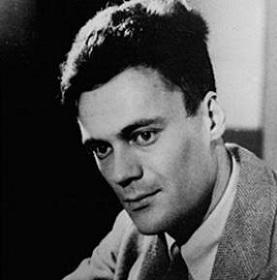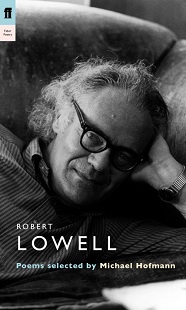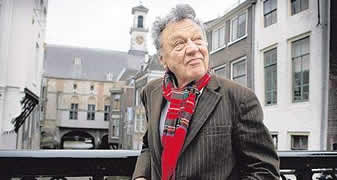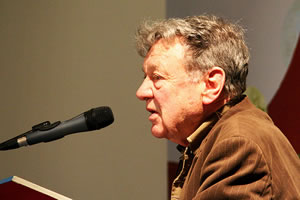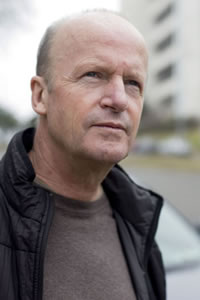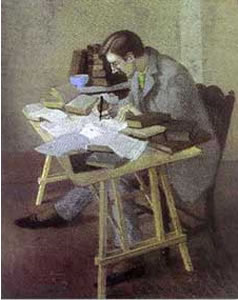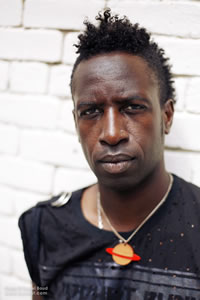De Nederlandse dichter, vertaler en journalist Jan Eijkelboom werd op 1 maart 1926 in Ridderkerk geboren. Zie ook mijn blog van 1 maart 2008 en ook mijn blog van 28 februari 2008 en ook mijn blog van 1 maart 2009.
Sluitertijd
Zie de afbladderende dichter.
Heb ik het goed? Kijkt hij
vanuit die plooien, de gelaagdheid
van aanzicht en overjas
nog steeds de lens tegemoet?
Zal ik hem vertellen hoe het
eindtraject moet worden afgelegd?
Ach, je gelooft je ogen niet
en wat hij zegt of prevelt
gaat ook al op de prent verloren –
De plek heeft hij zelf uitgekozen.
Een dichtgemetseld godshuis.
Maar in verweerde steen en brokkelige
kalk schuilt een betekenis
die nog verwoord wil zijn
wie weet nog uitgelegd.
Dreamtime
Er is geen begin en het einde is zoek.
Moge het sterven sereen zijn
toch zet het zich voort
in het bloedbad van een geboorte,
de geboorte van iemand anders dan,
dat valt niet te ontkennen.
Maar in het leven is ons gegeven
te doen alsof er geen dood was,
niet met de kop in het zand
maar juist op de uitkijk
naar weer een ander land,
een te bevaren kust.
En onderweg vermaan je nog een kind
dat zegt dat het zich dood verveelt:
ga in gods naam wat doen.
En het kind roept: maar ik bèn er toch?
Liefst zijn ook wij ons van geen kwaad bewust.
Lege kerk 1
Het hoog karkas, de nutteloze ruimte,
preekstoel en orgel afgedekt, een leegte
die het licht naar binnen zuigt.
De jongen die daar zat op bikkelharde,
nu weggehaalde banken, verzon eens
hoe je slingerend van lichtkroon
naar lichtkroon als Tarzan kon ontkomen
aan ’t herderlijke dwangbevel
dat onder hem de kudde deed verstarren.
Wat bleef is een afwezigheid
die heel die ruimte vult en reikt
tot aan het tongewelf, het schedeldak
van wie hier staat en ongeschonden
straks weer het heiligdom verlaat.

De Oostenrijkse schrijver, dichter en schilder Franzobel werd geboren op 1 maart 1967 in Vöcklabruck. Zie ook mijn blog van 1 maart 2007 en ook mijn blog van 28 februari 2008 en ook mijn blog van 1 maart 2009.
Deutschland marschiert
Es dampfte das Entgegenkommen, Mensch
mit Wandervereinen, Pokalen gesteinigt,
als man noch schlechte Kragenknöpfe hatte,
mit Schmerzen ging, um die Zehen Watte,
da man noch nichts von Pediküre geahnt,
Blasen, als ob das Erdreich jählings zerrisse
und Schritte linkshin zur Fläche
ekligen Leichnams Schwarzfinsternis,
Gesichter, todmüde, fertig die Nacht,
die halbvollen aus unendlichen Rücken
kommenden Blasen, die stinken im Schritt
und faulend noch schreien:
Deutschland marschiert.
Autoscooter/Loveparade: Sehne
Wie Sehnen, Sucht und See
Schnecken tief im Gras wie
Füße hat es nie gegeben,
keine Sonne, Flüstern nicht,
Milchgefühl, mit Abstand,
Blümchenmuster wie wir sind
unnahbar, Zuseher und/oder was
hat uns gestülpt. Heraus.
Franzobel (Vöcklabruck, 1 maart 1967)
De Engelse schrijver Jim Crace werd geboren op 1 maart 1946 in St. Albans, Hertfordshire. Zie ook mijn blog van 1 maart 2009.
Uit: The Pesthouse
„Everybody died at night. Most were sleeping at the time, the lucky ones who were too tired or drunk or deaf or wrapped too tightly in their spreads to hear the hillside, destabilized by rain, collapse and slip beneath the waters of the lake. So these sleepers (six or seven hundred, at a guess; no-one ever came to count or claim the dead) breathed their last in passive company, unwarned and unexpectedly, without experiencing the fear. Their final moments, dormant in America.
But there are always some awake in the small times of the morning, the love-makers, for instance, the night workers, the ones with stone hard beds or aching backs, the ones with nagging consciences or bladders, the sick. And animals, of course.
The first of that community to die were the horses and the mules, which the travelers had picketed and blanketed against the cold out in the tetherings, between the houses and the lake, and beyond the human safety of stockades. They must have heard the landslide – they were so close and unprotected – though it was not especially bulky, not bulky enough, probably, to cause much damage on its own. In the time that it would take to draw a breath and yawn, there was a muted stony splash accompanied by a barometric pop, a lesser set of sounds than thunder, but low and devious, nevertheless, and worrying – for how could anyone not know by now how mischievous the world could be? The older horses, connoisseurs of one-night stands when everything was devious and worrying, were too weary after yet another day of heading dawnways, shifting carts, freight and passengers, to do much more than tic their ears and flare their nostrils. Even when, a moment later, the displaced waters of the lake produced a sloshing set of boisterous waves where there had not been any waves before, the full-growns would not even raise their heads. But the younger horses and the ever-childish mules tugged against their ropes, and one or two even broke free but hadn’t the foresight to seek high ground in the brief time that remained.“

Jim Crace (St. Albans, 1 maart 1946)
De Zwitserse schrijver, cabaretier en liedjesmaker Franz Hohler werd geboren op 1 maart 1943 in Biel. Zie ook mijn blog van 1 maart 2009.
Uit: Die Steinflut
„Als die siebenjährige Katharina Disch mit ihrem vierjährigen Bruder Kaspar am Freitag, dem 9. September 1881 das Haus ihrer Großmutter betrat, wußte sie nicht, daß sie erst wieder bei ihrer Hochzeit von hier weggehen würde.
Ihr Vater hatte sie für ein paar Tage weggeschickt, weil die Geburt eines Kindes bevorstand, und ohne
Widerspruch hatte Katharina das Bündelchen mit den beiden Nachtgewändern und etwas Leibwäsche, das ihre älteste Schwester Anna bereitgemacht hatte, genommen, hatte noch ihre Holzpuppe Lisi so hineingesteckt, daß sie mit dem Kopf herausschaute, und war dann mit Kaspar
an der Hand aufgebrochen. Sie war froh, daß sie nicht daheim bleiben mußte.
Wie verändert war ihr die Mutter beim Abschied vorgekommen!
Sie lag im Schlafzimmer im oberen Stock, ihre Haare, die sie sonst immer aufgesteckt hatte, waren
offen über das Kissen ausgebreitet und hingen sogar über den Bettrand hinunter, sie war bleich und schwitzte, von Zeit zu Zeit preßte sie die Lippen zusammen, kniff die Augen zu und drückte mit beiden Händen auf die Bettdecke, unter der sich ihr Bauch wölbte. Katharina wollte ihr nur schnell von der Türschwelle aus auf Wiedersehn sagen, aber die Mutter winkte sie zu sich heran, strich ihr mit ihrer Hand, die ganz kalt war, über die Haare und sagte leise, sie solle die Großmutter grüßen, und sobald ihr neues Geschwisterehen da sei, werde sie jemanden schicken. Dann drehte sie sich tief einatmend
zur Seite, griff in die Schublade des Nachttischchens, holte einige gedörrte Zwetschgen heraus und gab sie ihrer Tochter mit, »für unterwegs, für dich und Kaspar«,
fügte sie hinzu und versuchte zu lächeln. Katharina steckte sie schnell in die Tasche ihrer Schürze, blieb stumm stehen und suchte immer noch mit den Augen die Mutter, die sie kannte und die derjenigen, die dalag, so wenig glich. »Muesch ke Angscht ha«, flüsterte ihr die Frau aus dem Bett zu, legte sich wieder auf den Rücken und schloß ihre Augen.“

Franz Hohler (Biel, 1 maart 1943)
De Franstalige, Zwitserse schrijver Jacques Chessex werd geboren op 1 maart 1934 in Payerne. Zie ook mijn blog van 1 maart 2009.
Uit: Le vampire de Ropraz
„Ropraz, dans le Haut-Jorat vaudois, 1903. C’est un pays de loups et d’abandon au début du vingtième siècle, mal desservi par les transports publics à deux heures de Lausanne, perché sur une haute côte au-dessus de la route de Berne bordée d’opaques forêts de sapins. Habitations souvent disséminées dans des déserts cernés d’arbres sombres, villages étroits aux maisons basses. Les idées ne circulent pas, la tradition pèse, l’hygiène moderne est inconnue. Avarice, cruauté, superstition, on n’est pas loin de la frontière de Fribourg où foisonne la sorcellerie. On se pend beaucoup, dans les fermes du Haut-Jorat. A la grange. Aux poutres faîtières. On garde une arme chargée à l’écurie ou à la cave. Sous prétexte de chasse ou de braconne on choie poudre, chevrotine, gros pièges à dents de fer, lames affûtées à la meule à faux. La peur qui rôde. A la nuit on dit les prières de conjuration ou d’exorcisme. On est durement protestants mais on se signe à l’apparition des monstres que dessine le brouillard. Avec la neige, le loup revient. Il n’y a pas si longtemps qu’on a tué le dernier, en 1881, sa dépouille empaillée s’empoussière à douze kilomètres dans une vitrine du musée du Vieux-Moudon. Et l’horrible ours venu du Jura. Il a éventré des génisses il n’y a pas quarante ans dans les gorges de la Mérine. Les vieux s’en souviennent, ils ne rient pas à Ropraz ni à Ussières. Au temps de Voltaire, qui a habité le château d’en bas, au hameau d’Ussières, les brigands attendaient sur la route principale, celle de Berne, des Allemagnes, plus tard les soldats revenus des guerres de la Grande Armée rançonnaient les honnêtes gens. On fait très attention quand on engage un trimardeur pour la moisson ou la pomme de terre. C’est l’étranger, le fouineur, le voleur. Anneau à l’oreille, sournois, le laguiole glissé dans la botte.“

Jacques Chessex (1 maart 1934 – 9 oktober 2009)
De Britse schrijver Giles Lytton Strachey werd geboren op 1 maart 1880 in Londen. Zie ook mijn blog van 1 maart 2007 en ook mijn blog van 28 februari 2008 en ook mijn blog van 1 maart 2009.
Uit: Lytton Strachey (Biografie door R. A. Scott-James)
„MANNING was now thirty-eight, and it was clear that he was the rising man in the Church of England.’ Eminent Victorians, from which these words are quoted, appeared in 1918, when Lytton Strachey himself was thirty-eight and was recognized as a rising man — perhaps the rising man — in the world of letters. Frank Swinnerton has said that he and another publisher’s reader, Geoffrey Whitworth, ‘were as excited before publication as the world was after it’. Augustine Birrell responded as wit to wit; the Liberal leader, Asquith, in his Romanes Lecture spoke of ‘Mr. Strachey’s subtle and suggestive art’. In the fourth year of war this provocative book vied with the war itself as a topic of conversation. It delighted and it scandalized.
By some it was admired for its subtle portraiture, its deft handling of the theme, its irony, its flexible prose. Others were thrilled by this cool attack, this scathing flanking movement, against old idols of the market-place already slightly discredited by the Edwardians and now sufficiently demoded
to invite hue and cry. Later, Strachey was to write a more important and equally entertaining book, Queen Victoria, but it was Eminent Victorians which made his name and fixed his reputation; and by that more than anything else he has been judged and often misjudged.
He was acclaimed as a new writer, but he was not a new writer. He had been almost continuously contributing articles to weeklies, monthlies, or quarterlies for over fourteen years, and a piece of masterly critical writing, Landmarks in French Literature, had appeared in book form in 1912 — but hardly anybody at that time read it. He is perhaps generally thought of as a man of letters belonging essentially to the decade that followed the Great War — that period of disillusion and clever flippancy, ingenious experiment and delicate fantasy, unsentimental, anti-romantic, playfully frank, and gracefully uninsistent upon anything too serious.“

Lytton Strachey (1 maart 1880 – 21 januari 1932)
Buste van Stephen Tomlin
De Japanse dichter en schrijver Ryūnosuke Akutagawa werd geboren op 1 maart 1892 in Tokio. Zie ook mijn blog van 1 maart 2009.
Uit: Rashomon
“I’m taking this hair… I’m taking this woman’s hair to… Well, I thought I’d make a wig.”
The servant was disappointed that the old woman’s answer was so unexpectedly dull. Along with the disappointment, those old feelings of hatred and contempt came flooding back to him. And somehow, he must have conveyed these feelings to the old woman. With the hairs she had stolen from the corpse still clutched in one hand, she mumbled in a raspy, toadish voice:
“I see. Well, perhaps it is immoral to pull out the hairs of the dead. But these corpses up here—all of them—they were just the sort of people who wouldn’t have minded. In fact, this woman whose hair I was just pulling out a moment ago—she used to cut snakes into 5-inch pieces, dry them, and go sell them at the camp of the crown prince’s palace guard, saying it was dried fish. If she hadn’t died in the plague, she would probably still be going there now. And yet, the guards said this woman’s dried fish tasted good, and they always bought it to go with their rice. I don’t think what she did was immoral. If she hadn’t done it, she would have starved to death, so, she just did what she had to. And this woman, who understood so well these things we have to do, would probably forgive me for what I’m doing to her too.”

Ryūnosuke Akutagawa (2 maart 1892 – 24 juli 1927)
De Duitse schrijfster en dichteres Sabina Lorenz werd geboren op 1 maart 1967 in München. Zij is mede-uitgeefster van het literatuurtijdschrift “außer.dem”. Zij publiceerde korte prozateksten en gedichten in bloemlezingen en tijdschriften. In 2007 verscheen haar dichtbundel Die Fremde ist ein Ort.
Und nun
Wie sich auf der Durchreise Gänse
unter Touristen mischten, ich saß, du sprangst
an den Gleisen entlang, still verwachsen
mit Heckenrosen, Hornkraut im Schienenbett.
Vergessen, dass du keine Steppschuhe trugst
und auf einmal dieser Angstflügel, die Gänse
kehren wieder und ihr Schrei: Eil! Eil! Wann
geht der Zug. Verlorene Federn
vom letzten Jahr. Du hobst sie auf, grinstest
in die Augen der Touristenkameras, breit, und
strichst und strichst diese zerzausten
Dinger. Versuch. Ein Spiel. Du saßt
ich sprang. War ja nichts zu sehen als Licht.

Sabina Lorenz (München, 1 maart 1967)
Zie voor nog meer schrijvers van de 1e maart en de 29e februari ook mijn vorige twee blogs van vandaag.
